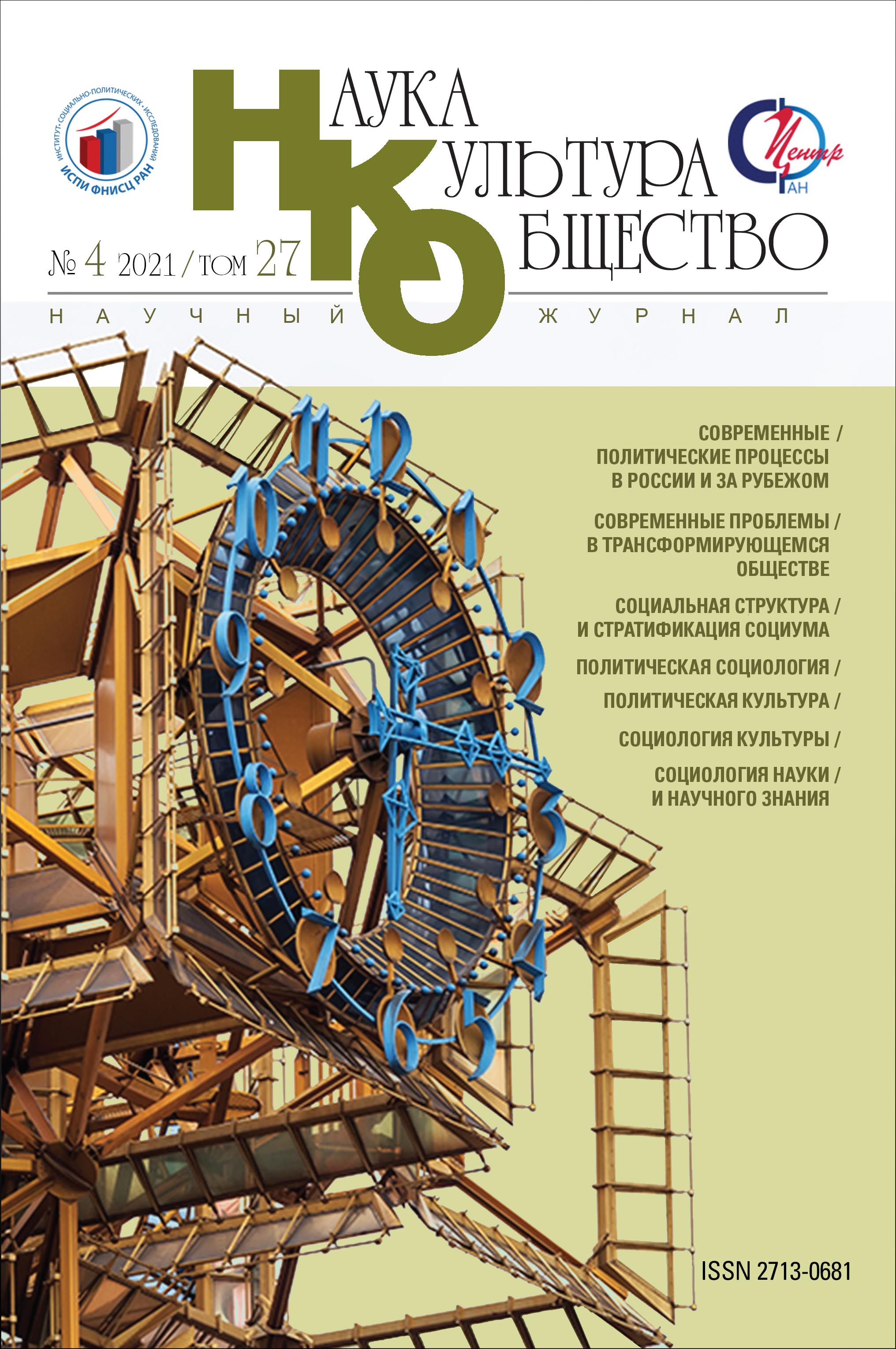Евразийская интеграция и внутренний конфликтный потенциал стран Центрально-Азиатского региона
Научная статья
Аннотация
Литература
2. Алексеева, Н. Н., Иванова, И. С. Средняя или Центральная Азия? // География. Первое сентября. 2003. № 28. С. 13-17.
3. Притчин, С. А. Российская политика в Центральной Азии в XXI в. // Проблемы национальной стратегии. 2020. № 6 (63). С. 76-92.
4. Процессы евразийской интеграции: социально-политическое измерение / Под общ. ред. Г. И. Осадчей. М. : БИБЛИО-ГЛОБУС, 2018. 374 c. ISBN 978-5-907063-15-0. DOI: 10.18334/9785907063150.
5. Тренды мирового социально-политического развития в условиях кризиса / Под ред. Е. Ш. Гонтмахера, Н. В. Загладина. М. : ИМЭМО РАН, 2012. 150 с. ISBN 978-5-9535-0331-0.
6. Российское общество и государство в условиях пандемии: социально-политическое положение и демографическое развитие Российской Федерации в 2020 году / Г. В. Осипов, В. К. Левашов, С. В. Рязанцев [и др.]. М. : Перспектива, 2020. 532 с. ISBN 978-5-905790-48-5. DOI: 10.38085/978-5-905790-48-5-2020-1-532.
7. Цыплин, В. Г. Особенности укрепления военно-технического потенциала государств-членов ОДКБ в 2019 году // Военная история России: проблемы, поиски, решения : Материалы Международной научной конференции, посвященной 75-летию Победы в Великой Отечественной войне: в 3 ч. (Волгоград, 11–12 сентября 2020 г.). Волгоград, 2020. С. 40-48.
8. Фомин, М. В. Россия. Матрица социальной (не)стабильности // Мировая экономика и международные отношения. 2010. № 8. С. 56-68. DOI: 10.20542/0131-2227-2010-8-56-68.
9. Фомин, М. В. Россия в мировых конфликтах. Горизонт – 2019 // Россия в новом веке: внешнеполитическое измерение. сборник материалов заседаний Экспертного совета Комитета Совета Федерации по международным делам за 2009 год. /Под общ. ред. А. А. Аслаханова, В. М. Соловьева и С. В. Кортунова. М., 2010. С. 157-161.
10. Селезнев, И. А. О первых итогах евразийской интеграции, достижениях и рисках Евразийского экономического союза // Социально-гуманитарные знания. 2020. № 6. С. 164-176. DOI: 10.34823/SGZ.2020.5.51488.
11. Журавлёв, В. Е. О некоторых тенденциях евразийской экономической интеграции // Вестник Института мировых цивилизаций. 2019. Т. 10, № 3(24). C. 5-9.
12. Левашов, В. К., Шушпанова, И. С., Афанасьев, В. А., Новоженина, О. П. Российское гражданское общество и государство в процессах евразийской интеграции // Наука. Культура. Общество. 2019. № 3-4. С. 66-77. DOI: 10.38085/2308829X-2019-3-4-66-77.
13. Евсеев, В. О., Селезнев, И. А. Конфликт-менеджмент и методы исследования региональных конфликтов // ЦИТИСЭ. 2021. № 3. С. 79-95. DOI: 10.15350/2409-7616.2021.3.07.
14. Рекк, Д. А., Егоров, В. Г. Социально-политическая эволюция кланов Центральной Азии // Социальные и гуманитарные знания. 2020. Том 6, № 3(23). С. 250-259. DOI: 10.18255/2412-6519-2020-3-250-259.
15. Профилактика терроризма и экстремизма в молодежной среде / Под общ. ред. А. П. Новикова ; АТЦ СНГ, МОФ «Российский фонд мира». М. : Изд-во «Русь», 2018. 96 с. ISBN 978-5-8090-0093-2.
16. Селезнев, И. А. Роль ОДКБ и ШОС в обеспечении безопасности стран Средней Азии // Социально-гуманитарные знания. 2017. № 4. C. 143-152.
Поступила: 25.10.2021
Опубликована: 13.12.2021



.jpg)



